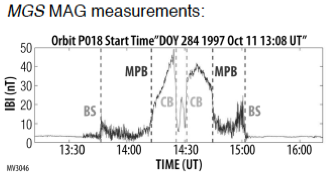- Determine the morphology of the ionosphere and magnetosheath (with LPW and SWEA)
- Determine the structure and topology of the magnetic cusp regions (with SWEA)
- Determine the convection electric field (with SWIA)

The dual vector fluxgate magnetometer (MAG) has two tri-axial fluxgate sensors, one mounted at the outer edge of a solar array, to provide functional redundancy and to allow the identification of magnetic fields generated by the spacecraft. MAG operates over a large dynamic range of ~ 60,000 nT with resolution 0.05 nT.
Measurement Objectives
MAG measures the intensity and direction of the magnetic field in all regions traversed by the spacecraft. The instrument sensitivity will measure the vector magnetic field in the unperturbed solar wind (B~3 nT), the magnetosheath (B~10-50 nT) and crustal magnetospheres (B<3000 nT). MAG has the ability to spatially resolve crustal magnetic cusps (horizontal length scales of ~100 km). In combination with other instrument, MAG will:
Useful Mission Documents
Archive Bundle Contents
Selecting and Requesting Data - The following index can be downloaded and edited to contain data that conform to your needs. This allows you to understand the scope of the data set and to tailor your request for specific products.
Citing Data Sets for Publications (to be developed)
Other Useful Products for Interpreting the Data
Measurement Objectives
MAG measures the intensity and direction of the magnetic field in all regions traversed by the spacecraft. The instrument sensitivity will measure the vector magnetic field in the unperturbed solar wind (B~3 nT), the magnetosheath (B~10-50 nT) and crustal magnetospheres (B<3000 nT). MAG has the ability to spatially resolve crustal magnetic cusps (horizontal length scales of ~100 km). In combination with other instrument, MAG will:
Useful Mission Documents
Mission Description
Spacecraft Description
Software Interface Specification (SIS) - Description of the instrument and data structures
Calibration Document - Description of calibration methods
Spacecraft Description
Software Interface Specification (SIS) - Description of the instrument and data structures
Calibration Document - Description of calibration methods
Archive Bundle Contents
Documentation - Directory containing the document collection, which includes references to refereed journals using this instrument, and information about calibration and explanation of data structures.
Raw Data - Directory containing the raw data files
Calibrated Data - Directory containing the calibrated data files
Derived Data - Directory containing advanced products
Raw Data - Directory containing the raw data files
Calibrated Data - Directory containing the calibrated data files
Derived Data - Directory containing advanced products
Selecting and Requesting Data - The following index can be downloaded and edited to contain data that conform to your needs. This allows you to understand the scope of the data set and to tailor your request for specific products.
As-flown Index - List of actual observations in order of acquisition
Requesting Data You will need to upload your edited file
Requesting Data You will need to upload your edited file
Citing Data Sets for Publications (to be developed)
Other Useful Products for Interpreting the Data
References - Publications by team members
Other Potential Relevant Data - Data that may be relevant from missions other than MAVEN
SPICE - Archived MAVEN SPICE ancillary data providing observational geometry (positions, orientations, instrument pointing, time conversions, etc.) are available from the PDS NAIF Node.
Other Potential Relevant Data - Data that may be relevant from missions other than MAVEN
SPICE - Archived MAVEN SPICE ancillary data providing observational geometry (positions, orientations, instrument pointing, time conversions, etc.) are available from the PDS NAIF Node.

 PDS: The Planetary Atmospheres Node
PDS: The Planetary Atmospheres Node


